

To get a sense of our place in the Universe, I highly recommend that you stop
to
take the The Power Of Ten
journey.
The Power of Ten is
"a visual journey consisting of 42 images -- 42 powers of ten. At one
end of the journey is the immensity of the known universe, some 10 000 000 000
years old and some 10 billion light years across. At the other end of the
journey is a depiction of the three quarks within a proton."
To put the further scales in perspective, I have put together the following
table showing our relative size in the grand scheme of things:
| An Atom | Approx 10-10 meters | 10 billionth the size of an average human being |
| A Cell | Approx 10-6 meters | A millionth the size of an average human being |
| An Adult Human Being | Approx 100 meters | Order of magnitude size: 1 meter |
| The Earth | Approx 10+7 meters | A ten million times larger than an average human |
| The Solar System | Approx 10+12 meters | A trillion times larger than an average human |
| The Milky Way Galaxy | Approx 10+20 meters |
A hundred million trillion times larger than an average human A hundred million times larger than the entire solar system |
| The Observable Universe | Approx 10+26 meters | Mind-bogglingly large!! |
Okay, now consider the fact that if one reduces our galaxy (forget about the observable Universe, for a second) to the size of a typical adult human being, our solar system would be no bigger than an atom. From a galactic perspective, whether or not our solar system exists or not is completely and utterly irrelevant - just as whether or not a given atom exists or not is completely and utterly irrelevant to your existence. In fact, you shed millions of skin cells each day and each cell is made of a millions of atoms.
And if that doesn't blow you away, consider that if you were to shrink our entire observable universe to the size of an average human, our galaxy would be no bigger than a cell and the solar system would be akin to a large atom.
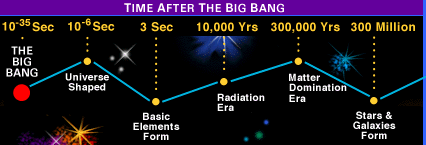


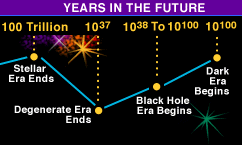
If it's hard to grasp the size of the universe, it's equally hard to imagine its age. Astronomers calculate that the universe originated about 13.7 billion years ago.
Imagine that the history of the universe is compressed into one year - with the Big Bang occurring in the first seconds of New Year's Day, and all our known history occurring in the final seconds before midnight on December 31. The present time corresponding to 12:00 AM on New Year's Day of the next year.
Using this scale of time, each month would equal a little over a billion years. Here's a closer look at when important events would occur when we imagine the universe in one year:
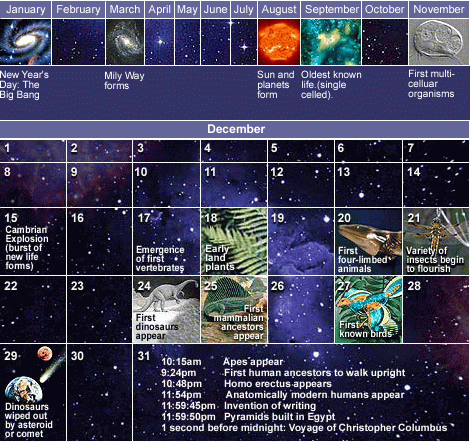
Let us look at the calendar in a bit more detail:
| Big Bang | January 1 |
| Origin of Milky Way Galaxy | May 1 |
| Origin of the solar system | September 9 |
| Formation of the Earth | September 14 |
| Origin of life on Earth | ~ September 25 |
| Formation of the oldest rocks known on Earth | October 2 |
| Date of oldest fossils (bacteria and blue-green algae) | October 9 |
| Invention of sex (by microorganisms) | ~ November 1 |
| Oldest fossil photosynthetic plants | November 12 |
| Eukaryotes (first cells with nuclei) flourish | November 15 |
| Sunday | Monday | Tuesday | Wednesday | Thursday | Friday | Saturday |
|---|---|---|---|---|---|---|
| 1 Significant oxygen atmosphere begins to develop on Earth. | 2 | 3 | 4 | 5 Extensive vulcanism and channel formation on Mars. | 6 | |
| 7
| 8 | 9 | 10 | 11 | 12 | 13 |
| 14
| 15 | 16 First Worms. | 17 Precambrian ends. Paleozoic Era and Cambrian Period begin. Invertebrates flourish. | 18 First oceanic plankton. Trilobites flourish. | 19 Ordovician Period. First fish, first vertebrates. | 20 Silurian Period. First vascular plants. Plants begin colonization of land. |
| 21 Devonian Period begins. First insects. Animals begin colonization of land.
| 22 First amphibians. First winged insects. | 23 Carboniferous Period. First trees. First reptiles. | 24 Permian Period begins. First dinosaurs. | 25 Paleozoic Era ends. Mesozoic Era Begins. | 26 Triassic Period. First mammals. | 27 Jurassic Period. First birds. |
| 28 Cretaceous Period. First flowers. Dinosaurs become extinct.
| 29 Mesozoic Era ends. Cenozoic Era and Tertiary Period begin. First cetaceans. First primates. | 30 First evolution of frontal lobes in the brains of primates. First hominids. Giant mammals flourish. | 31 End of Pliocene Period. Quaternary (Pleistocene and Holocene) Period. First humans. |
| Origin of Proconsul and Ramapithecus, probable ancestors of apes andmen | ~ 1:30 p.m. |
| First humans | ~ 10:30 p.m. |
| Widespread use of stone tools | 11:00 p.m. |
| Domestication of fire by Peking man | 11:46 p.m. |
| Beginning of most recent glacial period | 11:56 p.m. |
| Seafarers settle Australia | 11:58 p.m. |
| Extensive cave painting in Europe | 11:59 p.m. |
| Invention of agriculture | 11:59:20 p.m. |
| Neolithic civilization; first cities | 11:59:35 p.m. |
| First dynasties in Sumer, Ebla and Egypt; development of astronomy | 11:59:50 p.m. |
| Invention of the alphabet; Akkadian Empire | 11:59:51 p.m. |
| Hammurabic legal codes in Babylon; Middle Kingdom in Egypt | 11:59:52 p.m. |
| Bronze metallurgy; Mycenaean culture; Trojan War; Olmec culture; inventionof the compass | 11:59:53 p.m. |
| Iron metallurgy; First Assyrian Empire; Kingdom of Israel; founding ofCarthage by Phoenicia | 11:59:54 p.m. |
| Asokan India; Ch'in Dynasty China; Periclean Athens; birth of Buddha | 11:59:55 p.m. |
| Euclidean geometry; Archimedean physics; Ptolemaic astronomy; Roman Empire; birth of Christ | 11:59:56 p.m. |
| Zero and decimals invented in Indian arithmetic; Rome falls; Birth of Islam and the Islamic Civilization | 11:59:57 p.m. |
| Mayan civilization; Sung Dynasty China; Byzantine empire; Mongol invasion; Crusades | 11:59:58 p.m. |
| Renaissance in Europe; voyages of discovery from Europe and from Ming Dynasty China; emergence of the experimental method in science | 11:59:59 p.m. |
| Widespread development of science and technology; emergence of global culture; acquisition of the means of self-destruction of the human species; first steps in spacecraft planetary exploration and the search of extraterrestrial intelligence | Now: The first second of New Year's Day |
Within the scheme of the Cosmic Calendar, an average human life of 70-80 years is equivalent to approximately 0.16 cosmic second!
As one can see, human beings made their appearance rather late in the "game". For the most part, the Universe went merrily along - evolving according to the dictates of the laws of physics - without any human presence. And even now, the human beings can hardly claim to affect the course of Cosmic evolution.
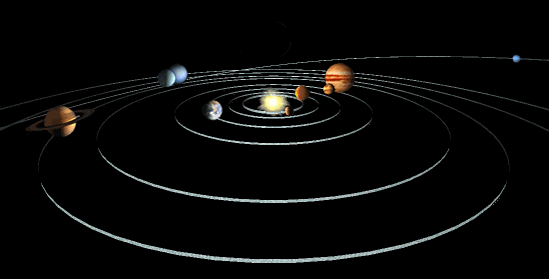
We may be tiny and we may have had little impact on the course of Cosmic evolution, but are we not at the center of it all?
Indeed, as we shall learn in a bit more detail, it was commonly believed that we, human beings, were at the center of creation. That the entire Universe revolved around us. The dynamic duo, Copernicus and Galileo, were the first to seriously call into question this assumption. They showed that rather than being at the center of the cosmos, the earth was but one small planet in orbit around the sun.
Andromeda: Sister Galaxy to the Milky Way
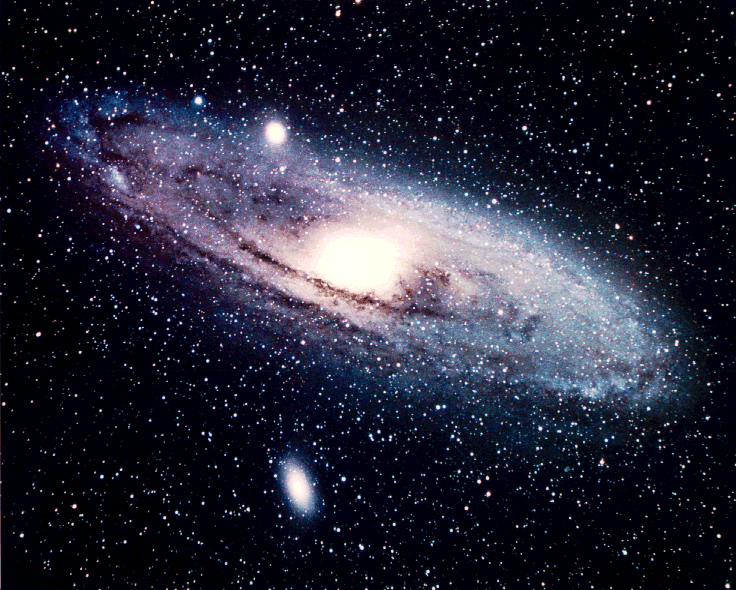 But, the sun must be at the center of the Universe? This idea was
debunked during the early years of the 20th century, when it was
discovered/realized that first, the sun was a smallish-average type,
one of 100 billion stars that makes up our galaxy, the Milky Way.
But, the sun must be at the center of the Universe? This idea was
debunked during the early years of the 20th century, when it was
discovered/realized that first, the sun was a smallish-average type,
one of 100 billion stars that makes up our galaxy, the Milky Way.
The Milky Way is a disk galaxy, a spiral galaxy, with the the disk
spanning 80,000 light years in diameter. Rather than being at the
center of the galaxy, the sun was out in the "burbs", roughly 25,000
light years away.
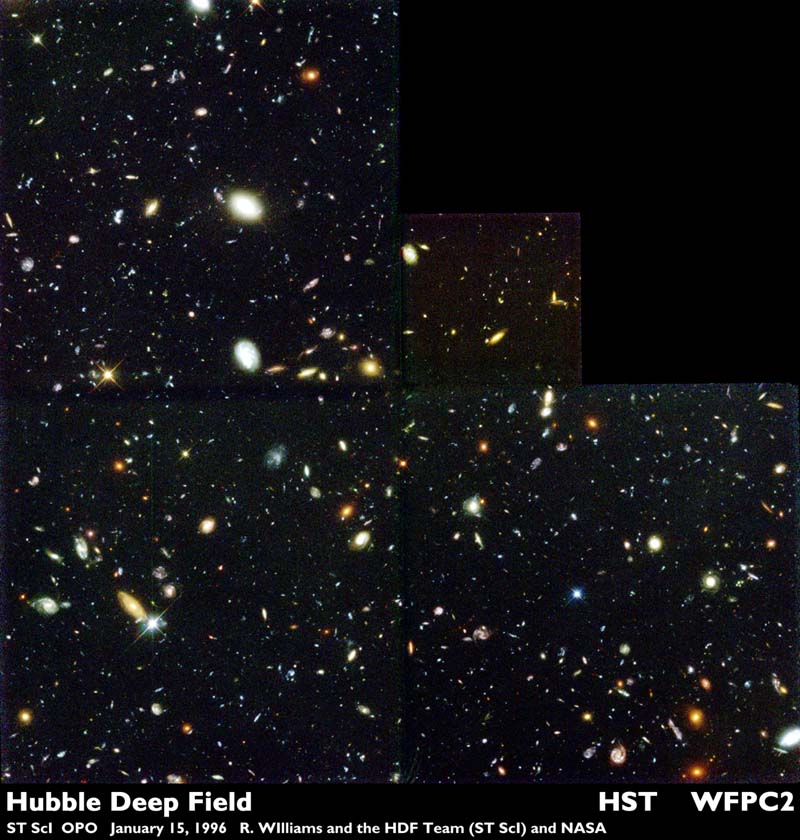
And, the Milky Way galaxy is itself an average, medium-sized galaxy,
occupying a rather non-descript neighbourhood in the Universe. It is
one of the billions of galaxies in the Universe, all of which are
moving away from each other due to the expansion of the Universe,
none of which can truly be called the Center of the Universe.
In fact, if we must claim that we are special, then the one achievement
that would allow us to make this claim legitimately is that we have
have been able to reach our current level of understanding regarding
the origins and the evolution of our Universe. That is truly incredible
in the literal sense of the word.

|

|